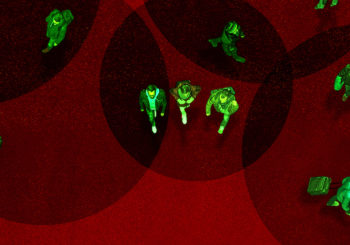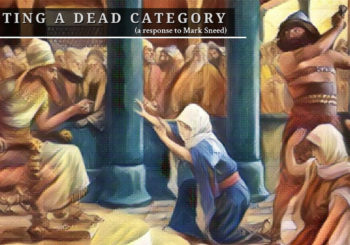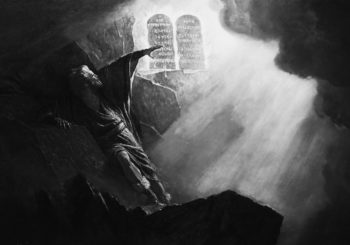The End of ‘Wisdom Literature’
This essay was adapted from a talk for Union Presbyterian Seminary’s Wisdom Webinar on April 27, 2021.
At the Annual Meeting of the Society of Biblical Literature in Chicago in 1994, John Collins said something that forever changed the way that I thought about the “Wisdom Literature” category commonly applied to Proverbs, Ecclesiastes, and Job along with the deuterocanonical books Sirach and Wisdom of Solomon.1This is a slightly revised version of my contribution to “Wisdom as a Category for Studying Ancient Texts and Discourses,” a panel discussion hosted by Union Presbyterian Seminary on 27 April 2021. A video recording of the panel is available here. The other participants were Samuel Adams of Union Presbyterian Seminary, Stuart Weeks of Durham University, Katharine Dell of University of Cambridge, and John Collins and Jacqueline Vayntrub of Yale Divinity School. I didn’t hear him say it—I was 13 years old and not yet attending SBL meetings—but I heard it second hand, in an article by Sarah Tanzer.2Sarah J. Tanzer, “Response to George Nickelsburg, ‘Wisdom and Apocalypticism in Early Judaism,’” in Conflicted Boundaries in Wisdom and Apocalypticism, ed. B. G. Wright and L. Wills, Society of Biblical Literature Symposium Series 35 (Atlanta: SBL, 2005), 42. Collins observed that Wisdom, “threatens to become an all-encompassing category. Any form of knowledge that is recognized as good may be dubbed ‘wisdom.’” This led me to wonder, who is doing the dubbing, and what do they think is good?
Recently, scholars have offered various approaches to defining and defending some version of the “Wisdom” category—ancient Near Eastern parallels, prototype theory, appeals to the Solomonic Corpus, a coherent tradition of instruction, common emphases within the texts, and so on.3See, e.g., Douglas B. Miller, “Wisdom in the Canon: Discerning the Early Intuition,” in Was There a Wisdom Tradition? New Prospects in Israelite Wisdom Studies, ed. Mark Sneed, AIL 23 (Atlanta: SBL, 2015), 87–113; Annette Schellenberg, “Don’t Throw the Baby Out with the Bathwater: On the Distinctness of the Sapiential Understanding of the World,” in Was There a Wisdom Tradition? New Prospects in Israelite Wisdom Studies, ed. Mark Sneed, AIL 23 (Atlanta: SBL, 2015), 115–43; John J. Collins, “Wisdom as Genre and as Tradition in the Book of Sirach,” in Sirach and Its Contexts: The Pursuit of Wisdom and Human Flourishing, ed. Samuel Adams, Greg Schmidt Goering, and Matthew J. Goff, JSJSup 196 (Leiden: Brill, 2021), 15–32. If you begin with the presupposition that such a category exists, and that Proverbs and Ecclesiastes and perhaps Job are its prototypical members, then there are a variety of arguments that may be made to justify its existence (though the fact that scholars feel the need to make them draws their effectiveness into question). But should we begin with that presupposition?
In all the debate about how to define the Wisdom category over the last century, that question has rarely been asked. The existence of the category was simply assumed. It was a “universal consensus,” a “basic scholarly intuition.” Its origins were never carefully investigated. The Wisdom category was simply part of the intellectual furniture we all carried around in our heads, and though we would frequently trip over it, we never thought to ask who put it there and why.
So that’s what I did.4Will Kynes, An Obituary for “Wisdom Literature”: The Birth, Death, and Intertextual Reintegration of a Biblical Corpus (Oxford: Oxford University Press, 2019). I found that the “Wisdom” category does not go back to ancient Jewish and Christian interpretation. We find these books grouped in a number of different ways for a number different reasons, but none that directly parallel the modern “Wisdom” category. Sure, there’s the Solomonic corpus (Proverbs, Ecclesiastes, and Song of Songs), the Poetry section in the Greek canon (which adds Job, Psalms, and frequently Sirach and Wisdom of Solomon), Josephus’s four books that contain hymns and instructions (likely Psalms, Proverbs, Ecclesiastes, Song of Songs), and the Jewish Sifrei Emet (Psalms, Job, and Proverbs), but if these were the same as “Wisdom Literature,” why don’t they include the same texts? The different contents reflect different criteria: categories quantitatively and qualitatively different from “Wisdom Literature.”
In fact, we don’t see discussion of a distinct “Wisdom Literature” corpus, one that includes Job while excluding Song of Songs and Psalms, until 1851, in Wisdom Teaching of the Hebrews: A Contribution to the History of Philosophy by Johann Bruch. Bruch’s contemporaries recognized that he had developed something new, so even if there had been hints of the category earlier, it was his version that shaped subsequent scholarship. And this is where Collins’s insight is so important.
In nineteenth-century Germany, Christians continued what Kant had identified as their long struggle to present Christianity as “a purely moral religion” while also in continuity with Judaism, which Kant claimed was characterized by dogmatic faith, theocratic institutions, legal coercion, and particularistic exclusion. Though Kant claimed Judaism only prepared the way for Christianity after it had been enlightened by Greek thought, Bruch attempted to find this enlightenment within the Old Testament itself. “Wisdom Literature,” as the “universalistic, humanistic, philosophical” collection within the Old Testament, as Franz Delitzsch characterized it at the time,5Franz Delitzsch, Das Buch Iob (Leipzig: Dörfling & Franke, 1864), 5. was Bruch’s effort to resolve Christianity’s struggle with its Jewish roots. Delitzsch adopted the category from Bruch, whom he claimed was the first to call attention to it, however he said that Bruch was “mistaken in placing [Wisdom] in an indifferent and even hostile relation to the national law and the national cultus, which he compares to the relation of Christian philosophy to orthodox theology.”6Franz Delitzsch, Biblical Commentary on the Proverbs of Solomon, 2 vols., CFThL 43, 47, trans. M. G. Easton (Edinburgh: T&T Clark, 1874–75), trans. of Salomonisches Spruchbuch (Leipzig: Dörffling & Franke, 1873), 1:46. Even today, independence from Israel’s law, cult, and history continues to be a dominant defining feature of “Wisdom Literature.” As Roland Murphy claims, the “most striking characteristic” uniting current definitions of “Wisdom Literature” is “the absence of what one normally considers as typically Israelite and Jewish.”7Roland E. Murphy, The Tree of Life: An Exploration of Biblical Wisdom Literature, 3rd ed. (Grand Rapids: Eerdmans, 2002), 1. Why have we chosen to build a category around the absence of Israelite religion? And might this focus have blinded us to the role in these texts of Israel’s law, covenants, history, and revelation in the blurry periphery of our vision?
Now, that the traits commonly associated with “Wisdom Literature”—universalism, humanism, rationalism, secularism, individualism, skepticism—reflect so clearly the post-Enlightenment context in which the category first appeared does not in itself discount the category. But the fact that those scholars dubbed “wisdom” precisely what they recognized as good should make us suspicious. It sure seems like another example of scholars looking down the well and seeing their own reflections. And the anti-Jewish perspectives shimmering at the bottom of that well are concerning. I doubt any scholars adopt the category for those reasons today, but that doesn’t erase their influence. The continuing struggle to integrate the “Wisdom Literature” with the theology of the rest of the Hebrew Bible, it appears, was baked into the category from the beginning, since apparent disregard for that theology was the primary criterion on which the category was based. The origins of the “Wisdom Literature” category were anything but arbitrary.
Recognizing the end, or purpose, of the category should lead us to consider ending its use. When we add the difficulties in defining and delimiting the category that continue to plague the field, leading to the recent debate about its validity,8See, e.g., the essays in Mark Sneed, ed. Was There a Wisdom Tradition? New Prospects in Israelite Wisdom Studies, AIL 23 (Atlanta: SBL, 2015). then the case for taking this mental furniture to the curb gets even stronger. “Wisdom Literature” is not dead because it’s a modern construct, but because it’s a modern construct that distorts rather than illuminates as it imposes a modern worldview on ancient texts. It’s a hindrance rather than a help to interpretation. Heuristic categories cannot outlive their interpretive usefulness, since that is the only purpose they serve. This power to distort interpretation is why this is more than an arcane academic debate about the proper label for ancient texts. Too often, we allow the category to do the interpretive work for us, such as when Michael Fox, one of the most well-informed and skilled of biblical interpreters, nevertheless claims “land” in Prov 2:21 refers to “this world” and not the land of Israel, because, “Concern for the Land of Israel is absent from biblical Wisdom literature.”9Michael V. Fox, Proverbs 1–9, AB 18A (New York: Doubleday, 2000), 123.
But dispensing with a category like this is difficult. I know. I’ve had to rename and completely redesign my “Wisdom Literature” class, and I’m no longer sure how to describe my specialty—the books formerly known as Wisdom Literature? Plus, what about all these theories about the wise in Israel, schools and scribalism, and Wisdom theology? But the “Wisdom” category is simply too weak a foundation for the speculative historical and theological superstructures built upon it. It’s far better to be able to say less that can actually be supported by the evidence than a lot more that cannot.
And we don’t have to stop talking about the concept of wisdom in the Hebrew Bible and beyond or even stop comparing the so-called Wisdom books to one another. Wisdom is a major theme in all three books (and 1 Kings 1-11) and must be discussed in their interpretation. But they are not “Wisdom Literature” in any definitive, categorical sense that would justify the assumption that they were composed in a separate school with a distinctive theology that requires its own introductions, specialists, or conference sessions any more than grouping texts based on their interest in other concepts, such as righteousness or holiness, would. We can also continue to investigate the similarities between Egyptian Instructions, Proverbs, Sirach, and other instructional literature (including Deuteronomy). We don’t need the “Wisdom” category to do that. In fact, we can even do this work better, with greater accuracy, without carrying along all the poorly packed baggage of the “Wisdom” category.
Developments in genre theory are pushing the field in this direction anyway—away from taxonomic categories, which attempt to determine what a text is. Instead, genres are increasingly seen as dynamic groupings that identify salient features shared by groups of texts as perceived by culturally contextualized readers.10See, Kynes, Obituary for “Wisdom Literature,” 107–45. Combining those perspectives will diffuse the influence of any interpretive bias, mine included, and offer a fuller, three-dimensional understanding, as texts are read at the intersection of multiple genre groupings rather than in a single genre category. We should no longer feel the need to find a single box in which to contain the meaning of these texts, “Wisdom Literature,” “Poetry,” or otherwise. Instead, we can appreciate how the individuality of each text emerges through its affinities with various groups of other texts, such as Job’s connections with lament and dialogue in the Hebrew Bible and beyond, as well as prophecy and even history.11See Kynes, Obituary for “Wisdom Literature,” 149–78. If one must put these texts into some category for pragmatic purposes, then I would endorse the traditional Jewish category, the Writings, which, in its non-specific name and diverse contents, recognizes the idiosyncrasy of the thirteen books it contains, thereby encouraging the multiplication of intertextual comparisons amongst the books it contains that I advocate here. Burying the nineteenth-century “Wisdom Literature” category as the genre category of these texts will enable new perspectives on Israelite wisdom and the so-called Wisdom books to bloom.
End Notes
1. This is a slightly revised version of my contribution to “Wisdom as a Category for Studying Ancient Texts and Discourses,” a panel discussion hosted by Union Presbyterian Seminary on 27 April 2021. A video recording of the panel is available here. The other participants were Samuel Adams of Union Presbyterian Seminary, Stuart Weeks of Durham University, Katharine Dell of University of Cambridge, and John Collins and Jacqueline Vayntrub of Yale Divinity School.
2. Sarah J. Tanzer, “Response to George Nickelsburg, ‘Wisdom and Apocalypticism in Early Judaism,’” in Conflicted Boundaries in Wisdom and Apocalypticism, ed. B. G. Wright and L. Wills, Society of Biblical Literature Symposium Series 35 (Atlanta: SBL, 2005), 42.
3. See, e.g., Douglas B. Miller, “Wisdom in the Canon: Discerning the Early Intuition,” in Was There a Wisdom Tradition? New Prospects in Israelite Wisdom Studies, ed. Mark Sneed, AIL 23 (Atlanta: SBL, 2015), 87–113; Annette Schellenberg, “Don’t Throw the Baby Out with the Bathwater: On the Distinctness of the Sapiential Understanding of the World,” in Was There a Wisdom Tradition? New Prospects in Israelite Wisdom Studies, ed. Mark Sneed, AIL 23 (Atlanta: SBL, 2015), 115–43; John J. Collins, “Wisdom as Genre and as Tradition in the Book of Sirach,” in Sirach and Its Contexts: The Pursuit of Wisdom and Human Flourishing, ed. Samuel Adams, Greg Schmidt Goering, and Matthew J. Goff, JSJSup 196 (Leiden: Brill, 2021), 15–32.
4. Will Kynes, An Obituary for “Wisdom Literature”: The Birth, Death, and Intertextual Reintegration of a Biblical Corpus (Oxford: Oxford University Press, 2019).
5. Franz Delitzsch, Das Buch Iob (Leipzig: Dörfling & Franke, 1864), 5.
6. Franz Delitzsch, Biblical Commentary on the Proverbs of Solomon, 2 vols., CFThL 43, 47, trans. M. G. Easton (Edinburgh: T&T Clark, 1874–75), trans. of Salomonisches Spruchbuch (Leipzig: Dörffling & Franke, 1873), 1:46.
7. Roland E. Murphy, The Tree of Life: An Exploration of Biblical Wisdom Literature, 3rd ed. (Grand Rapids: Eerdmans, 2002), 1.
8. See, e.g., the essays in Mark Sneed, ed. Was There a Wisdom Tradition? New Prospects in Israelite Wisdom Studies, AIL 23 (Atlanta: SBL, 2015).
9. Michael V. Fox, Proverbs 1–9, AB 18A (New York: Doubleday, 2000), 123.
10. See, Kynes, Obituary for “Wisdom Literature,” 107–45.
11. See Kynes, Obituary for “Wisdom Literature,” 149–78. If one must put these texts into some category for pragmatic purposes, then I would endorse the traditional Jewish category, the Writings, which, in its non-specific name and diverse contents, recognizes the idiosyncrasy of the thirteen books it contains, thereby encouraging the multiplication of intertextual comparisons amongst the books it contains that I advocate here.
Subscribe now to receive periodic updates from the CHT.





